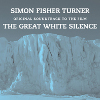Simon Fisher Turner, "The Great White Silence"

This massive double-album was pretty much a dream commission for Simon Fisher Turner: being asked by the British Film Institute to score the restored footage from Robert Falcon Scott's doomed 1910 expedition to the South Pole.  Given the demands and difficulties involved (soundtracking endless silent footage of cavorting penguins, for example), I'd say Simon's efforts were hugely successful in regards to verisimilitude, ingenuity, subtlety, and creating an appropriately haunted and desolate mood.  When taken as a stand-alone album with no visual context, however, the long lulls between flashes of beauty and interludes of bittersweet whimsy can be a bit wearying.
To state that Simon Fisher Turner has had an interesting career trajectory would be a bit of an understatement, as he has been a child actor, a teen pop artist, a member of The The, and one of the two comic geniuses behind the enigmatic Deux Filles.  He is most well-known, however, for his work as a soundtrack composer, having scored Loaded as well as some some films involving music-savvy folks like Derek Jarman and David Lynch.  Scoring The Great White Silence would have been daunting for anyone though.  Even the BFI's restoration of the film was nightmarishly complicated, as it had to be painstakingly pieced together from Herbert Ponting's negatives and his notes rather than an existing print.  That turned out to be ominous foreshadowing for Turner's own Herculean challenge (he actually described the experience as "terrifying"): composing a compelling score for two hours of black and white silent footage of ice, penguins, and men that were about to die slowly and miserably.  The task was further complicated by the fact that the film is a fairly high-profile and historically important work and that the music had to add drama and mood to Ponting's material without ever overpowering it.
The BFI's Jane Giles summarized Turner's quandary perfectly as "the score is really important to how to sell a two-hour non-fiction film where there's a lot of penguins and a lot of ice and not much drama."  Ponting's footage wasn't intended as a feature film documenting the end of one of England's greatest explorers– it was commissioned for a series of newsreels to sate the public's thirst for constant updates regarding the expedition and for adorable footage of penguins, which no one in England had seen before.  He didn't even attempt to weave it into a film until ten years later.  Consequently, it has some shortcomings regarding its narrative arc.  Naturally, the ultimate outcome of the voyage retroactively adds gravity, but Turner still had to make it all seem appropriately gripping without transforming Scott's final days into a music video for a Simon Fisher Turner ambient piece.
Rather than launching right into constructing the composition, Turner instead devoted quite a bit of effort to searching out sounds that had strong connections to the footage.  Appropriately, there is quite a bit of silence here, but it is meaningful silence.  Chris Watson had actually made some recordings in the hut where Captain Scott died (for an unrelated project) and helpfully offered them to Turner.  More overtly, Simon also employed what he calls "fake Foley effects" to match the actions taking place on the screen, like faking wind noises by dragging a microphone along a satin curtain.  Additionally, he had excellent luck acquiring quite a few other thematically appropriate sounds, recording the still-intact bell from Scott's ship, locating some contemporaneous gramophone recordings, and sleuthing out the hymn used to close Scott's memorial service.  Once all these elements fell into place, Simon's anxiety subsided a bit and everything started to cohere into a workable shape and trajectory.
The core of the soundtrack is built upon very slow-moving and minimal ambient drone that generally stays fairly austere and melancholy in tone.  Some of it is a bit bland, but I like most of it–in fact, some of it is incredibly beautiful.  The synthesizer parts rarely get the chance to stick around long enough to fully engulf me though, presumably because penguins, precocious cats, and dancing seamen keep appearing on the screen to necessitate a mood shift.  Fortunately, the resultant interludes are exactly what makes this piece so unique and fascinating.  In fact, the scratchy gramophone recordings of a female classical vocalist and the nakedly unprocessed closing hymn are among the most poignant and stunning moments of the entire album.  Though the "found" snippets of music tend to frequently steal the show, they wouldn't work if Turner hadn't done such an amazing job flowing seamlessly between relatively disparate moods (from "banjo hoedown" to "otherworldly, pitch-shifting ambiance," for example).  For all its digressions, the piece never loses the feel of an unfolding whole.  Simon also does an excellent job breaking up his sprawling opus with intelligent textural juxtapositions, cutting through his electronic reverie with sharp strings, scratchy old 78s, swooping theremins, and well-placed field recordings.
As a soundtrack, The Great White Silence probably exceeded everyone's highest expectations, as it manages to be sublime and deeply emotionally resonant without ever becoming too forceful.  In fact, it may very well be a masterpiece, though I won't know for certain until the film gets a US release.  As a decontextualized album, it is a bit flawed solely because it has been removed from its intended purpose as part of a larger whole.  There are a number of passages that I absolutely love, but they slowly trickle out over a period of nearly two hours, which makes this a tough album to listen to in its entirety.  This would be a lot easier to fully embrace if I could isolate individual stretches, but am sure chopping the soundtrack into smaller pieces would have wrecked the flow and synchronicity.  Turner had to choose between making a great Simon Fisher Turner album and making great soundtrack and he chose the latter, but he certainly came admirably close to nailing both.
Samples:
 
 



